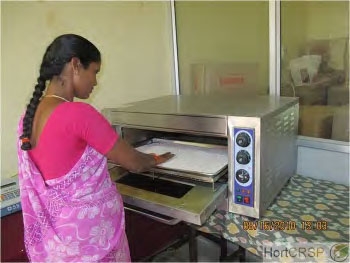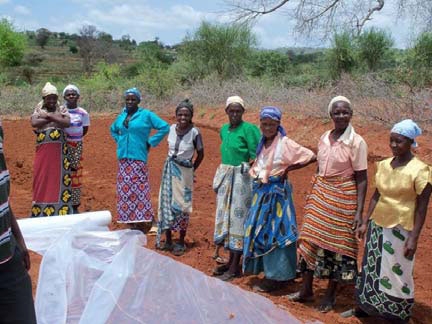Addressing nutrition and poverty through horticulture
Nutrition, food security and sufficient family incomes are challenges in many parts of the world. Half the world’s people live in rural areas in developing countries. Because hunger and malnutrition are often linked to poverty, providing economic opportunities through horticultural production not only helps family incomes, but also addresses food security and nutrition. Training women to produce and market horticultural crops in the developing world also helps provide a much-needed income stream for families with children.
UC Davis is addressing food security and economic development in Africa, Southeast Asia, Central America, and elsewhere, by coordinating an international horticulture program. The Horticulture Collaborative Research Support Program (Hort CRSP; pronounced "hort crisp") is one of 10 CRSP programs that focus on global food production and solving food and nutrition problems in developing countries. UC Davis leads the Hort CRSP, with funding support from the U.S. Agency for International Development (USAID).
Examples of projects conducted by researchers and educators throughout the world include:
- Inexpensive cold storage systems in rural, developing areas to prolong food longevity; see page 2
- Concentrated solar drying of fruits and vegetables in East Africa; see page 3
- Improving safety and quality of tomatoes in Nigeria; see page 3
- Smallholder flower production in Honduras for export markets; see page 3
The overarching goals of the Hort CRSP are to reduce poverty and improve nutrition and health of the rural poor, while improving the profitability and sustainability of horticulture in the developing world. Priorities in the Hort CRSP include gender equity, sustainable crop production, postharvest technology, food safety, market access, and financing. The program awards research funding in the U.S. and abroad to:
- Realize opportunities for horticultural development
- Improve food security
- Improve nutrition and human health
- Provide opportunities for income diversification
- Advance economic and social conditions of the rural poor, particularly women
Dr. Elizabeth Mitcham, UC Cooperative Extension specialist in the Department of Plant Sciences at UC Davis and director of the Hort CRSP, notes, “By harnessing the research, training, and outreach expertise of the land-grant universities in the U.S. to work with partners in developing countries, we can improve horticultural capabilities in much the same way that the land-grant system helped revolutionize American agriculture.”
In the three years since the program’s inception, several projects have been completed, and many are ongoing. The program’s website offers a plethora of information, along with newsletters that highlight individual projects.
The program also has a YouTube channel, with videos on Hort CRSP projects. Some of the videos are about projects that are especially important in developing countries, including:
- The TRELLIS project — bringing together graduate students and in-country development organizations; YouTube link
- Using cell phones to give real-time information to growers in rural areas of India; YouTube link
- Inexpensive cultivation practices for smallholder farmers; YouTube link
- Indigenous products increase incomes in Ghana; YouTube link
- Saving indigenous crop seeds in Southeast Asia for resource-poor farmers; YouTube link
UC Davis, ranked first in the U.S. on research related to agriculture, food science and nutrition, and plant and animal science, is positioned to serve global needs related to food and nutrition. Of the 10 CRSP programs administered by USAID, two of the programs are based at UC Davis — the Hort CRSP program, and the BASIS CRSP, which was highlighted in a recent Food Blog post and addresses financial issues related to agricultural productivity.
Comments:
How can horticulture be effectively improved in developing countries?





For grad students who might be interested: We're currently accepting applications to participate in our next round of Trellis projects. Deadline is June 6.
Posted by Brenda Dawson on May 3, 2012 at 10:32 AM